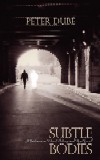Subtle Bodies is a fascinating little book, a “fictional biography” that takes as its inspiration the life of René Crevel – French writer, idealist, communist, and occasional medium. The real-life Crevel is known largely as a friend and associate of Surrealist Manifesto author André Breton. He was born in 1900 and committed suicide at thirty-five years of age; the book begins at the end, as a dying Crevel combs through his past in a combination of flashback and phantasmagoric hallucination. It’s an ambitious premise, this committing of history to fiction, but Peter Dubé creates both a compelling story and a vivid gloss on a crucial period for art and social movements. It has elements of the portrait-of-the-artist genre, but ultimately Subtle Bodies is a novel about desire, possession, and the struggle toward transformation (personal, social, political), told through layers of narration that overlap like simultaneous dreams.
At the story’s heart is Crevel’s attraction to and friendship with the charismatic and intractably homophobic Breton. Fearing Breton’s disapproval and revulsion, Crevel partly hides his self-discovery as a young gay man in Paris as well as his erotic forays into public cruising grounds and gay enclaves. But Breton remains a central force in Crevel’s life, and the tension between the two men spools out into various shapes over the course of their relationship, mirroring broader tensions between convention and progress, ideas and practice. Their alliance is cemented early on, when Crevel reveals that he has taken part in a séance – and not only that, has gone into a trance, describing “crazy things, visions of other times and places, mysterious voices coming through me, prophecies.” Breton is thrilled, and this first experience sets off a string of Surrealist experiments that are ever more bizarre and sinister.

Subtle Bodies
Peter Dubé
Lethe Press
$13
paper
94pp
978-1-59021-330-8
… the fantastic narrative of a library – a vast glittering structure of books, of writing, measureless and beyond counting … the accumulation of the art and knowledge of an almost equally uncountable number of civilizations … All of it housed in architecture composed on rigidly binaristic principles. A whole snaking, labyrinthine form built on a system of simple ‘yeses’ and ‘noes,’ blacks and whites, ones and zeroes.
Yes, these “predictions” are a bit disingenuous, but that’s part of the book’s charm. Dubé doesn’t pretend to not know what he knows – or, he admits that he knows we know that he’s just pretending not to know. Not limiting himself to historical evidence and tone, he brings all he has to bear on this novel, which saves it from being a dry lecture on art history or a bare-bones biography. Instead, it’s a living work of contemporary fiction.
Dubé’s writing is masterful and evocative, often walking the edge of the overblown and baroque without falling in. Though his passages on sex are among the book’s richest, his eroticism spills into the novel at large, imbuing every experience with a sheen of arousal and intimacy – making us feel the texture and smell of the nightclub, the union hall, the small apartment slowly filling with gas.
Subtle Bodies is an absorbing study in “the strongest dreamers,” as Dubé puts it: the visionary and occasionally insane people who shape the world. These people pass through Crevel, leaving indelible marks, just as Crevel seems to have passed through Dubé; Subtle Bodies is the mark he’s left. mRb






0 Comments